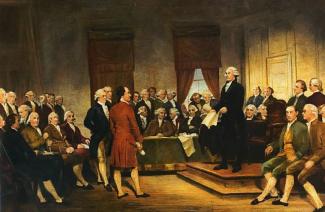Constitution Day

Painting by Junius Brutus Stearns / Wikimedia Commons
George Washington at Constitutional Convention of 1787, signing of U.S. Constitution.
Origins of Constitution Day
Constitution Day commemorates the signing of the U.S. Constitution in 1787. This historic document, signed by the Founding Fathers at the Constitutional Convention in Philadelphia, established the framework for the nation's government.
The celebration of Constitution Day has its origins in the early 20th century when the Daughters of the American Revolution proposed the idea of a holiday to honor the Constitution. It became an official federal observance in 2004, thanks to legislation introduced by Senator Robert Byrd, who was a fervent believer in the importance of civic education and understanding the Constitution's principles.
Cultural Significance
Constitution Day serves as a vital reminder of the core principles upon which the United States was founded. It highlights the enduring relevance of the Constitution as a living document that shapes the nation's legal and political landscape. The celebration often involves educational activities, discussions, and public events aimed at promoting civic awareness and understanding of the Constitution's significance.
Implications for Ending Racism
The Constitution was drafted in 1787 during a time when slavery was legal in the United States, and it contained provisions that accommodated and protected the institution of slavery. The infamous Three-Fifths Compromise, for example, counted enslaved individuals as three-fifths of a person for the purposes of representation in the House of Representatives, reinforcing the dehumanizing nature of slavery.
While the Constitution did not explicitly use racial language, its original text did not guarantee the rights and freedoms we associate with full citizenship to all people. It was written during an era when African Americans were held in bondage and systematically denied basic human rights.
Over time, through the amendment process and judicial interpretation, the Constitution has been used to address and rectify some of the injustices embedded in its original text. Amendments like the Thirteenth (abolishing slavery), Fourteenth (establishing equal protection under the law), and Fifteenth (granting the right to vote regardless of race) have played a crucial role in expanding civil rights and combating racism.
